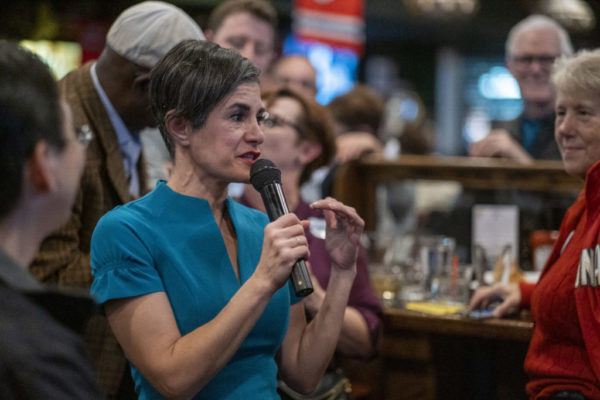Arlington’s top prosecutor is seeking an attorney to lead a new unit that reviews potentially wrongful convictions.
The unit — the first unit of its kind in Northern Virginia, according to Commonwealth’s Attorney Parisa Dehghani-Tafti — launched a little more than seven months ago.
At the time, Dehghani-Tafti said that no full-time staff would be assigned to only this unit because there wouldn’t be enough work. In her initial announcement, she said it would be led by Chief Deputy Commonwealth’s Attorney Cari Steele and Assistant Commonwealth’s Attorney Paul Wiley.
That has changed in the last half-year, with the position evolving into a full-time job “in its own right,” she tells ARLnow.
“It’s to the County Board and County Manager’s credit that they recognize the importance of the Conviction Review Unit,” Dehghani-Tafti said, adding that “the money is coming from the County Manager’s budget.”
Dehghani-Tafti, who was elected on her pledge to reform the local criminal justice system, made setting up such a unit a campaign promise when she ran for office in 2019.
She said her office regularly receives requests to review cases from a variety of sources, including convicted individuals, their legal counsel and various advocacy organizations.
“We take time to review these requests in a thorough manner,” she said. “This involves a lot of work and requires us not only to go through our own files, but also to seek files and records from as many sources as possible, reviewing forensic testing, and sometimes seeking out additional forensic testing.”
Initially, she said she thought this could be done in house, and the approved 2021-22 budget for her department only requested four new positions, all assigned to reviewing footage from body-worn cameras. (The Arlington County Police Department began wearing cameras in December 2020.)
“I try to be conservative with the budget, so I was hesitant to ask for additional [employees] until and unless I had the workload to support it,” she said. “I’m particularly sensitive to the reality that in this era of Covid, the County is facing immense funding demands from multiple fronts, but in this case, the work of the Conviction Review Unit has truly become a full time job in its own right.”
As for the positions related to body-worn cameras, those are already filled and the attorneys strained, she said.
“We also are finding that the BWC requires more of a workload than four attorneys can handle,” she said. “As I anticipated in March, based on the hours of BWC we were seeing, we definitely need more than the four additional attorneys.”
Dehghani-Tafti initially told the County Board that prosecutors will review about 15,000 hours of body worn camera video evidence this year — roughly equivalent to all the working hours of more than seven attorneys. The Office of the Magistrate, which reviews criminal conduct complaints, said it has the resources needed to review footage, however.
The conviction review position Dehghani-Tafti is seeking to fill, officially titled Commonwealth Attorney II, would pay between $91,500 and $140,000 annually. Whoever fills the role would spend his or her time engaged in a “specialized, time-consuming legal process” involving the following responsibilities, according to the job listing:
- Identifying and defining the involvement of the former police officers in the casework and the conviction of defendants prosecuted by the Office of the CWA;
- Conducting a thorough review of files, records, evidence and testimony in those cases;
- Testing the validity of evidence (e.g., analyzing chains of custody);
- Determining acts and sources of any intentional or unintentional wrongdoing in the development and prosecution of these cases;
- Recommending courses of action based on review of these cases (e.g., exoneration);
- Determining if and when a victim should be contacted regarding the conviction review process; and
- Performing other tasks that may be assigned as needed to complete the post-conviction review process.


